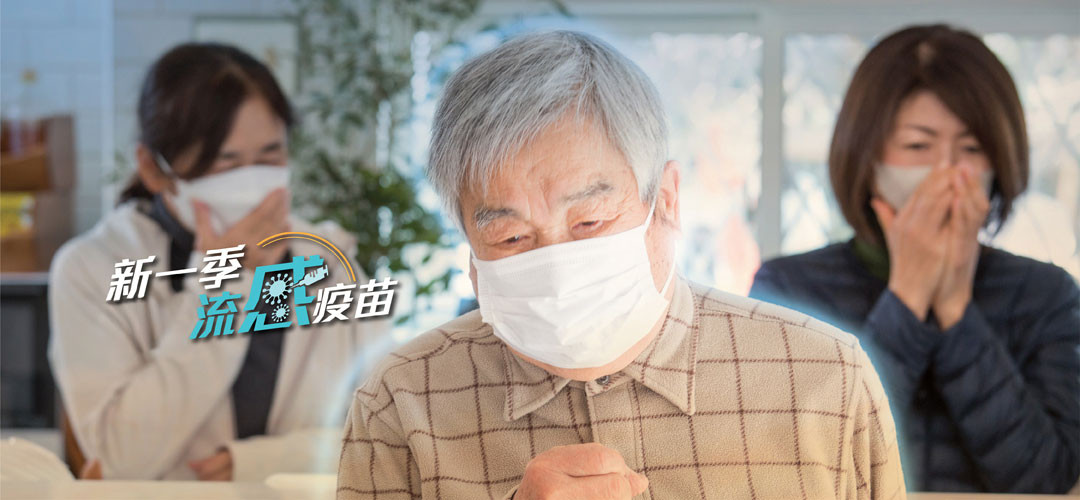
Home>Vaccination Services> Seasonal Influenza Vaccine
2025/26
Seasonal Influenza Vaccine
Influenza occurs in Hong Kong throughout the year. Seasonal influenza refers to the viruses that circulate in the human population and cause widespread illnesses especially during each influenza season.
To ensure the safety of yourself and your loved ones, it is crucial to familiarize yourself with the seasonal influenza vaccine. Take proactive measures now by staying informed about the available seasonal influenza vaccine options.
an A/Victoria/4897/2022 (H1N1)pdm09-like virus an A/Croatia/10136RV/2023 (H3N2)-like virus a B/Austria/1359417/2021(B/Victoria lineage)-like virus a B/Phuket/3073/2013(B/Yamagata lineage)-like virus If egg-based trivalent influenza vaccine is being used, the influenza B component shall contain a B/Austria/1359417/2021 (B/Victoria lineage)-like virus.
an A/Wisconsin/67/2022 (H1N1)pdm09-like virus an A/District of Columbia/27/2023 (H3N2)-like virus a B/Austria/1359417/2021(B/Victoria lineage)-like virus a B/Phuket/3073/2013(B/Yamagata lineage)-like virus If cell culture or recombinant based trivalent influenza vaccine is being used, the influenza B component shall contain a B/Austria/1359417/2021 (B/Victoria lineage)-like virus.
The following 3 vaccines are recommended for use in Hong Kong by the Scientific Committee on Vaccine Preventable Diseases:
Inactivated Influenza (IIV)
Recombinant Influenza Vaccine (RIV)
Live Attenuated Influenza Vaccine (LAIV)
| Inactivated Influenza Vaccine | Recombinant Influenza Vaccine | Live Attenuated Influenza Vaccine | |
| Vaccine Type | Contains killed (inactivated) virus | Contains recombinant protein | Contains weakened live virus |
| Administration | Intramuscular injection | Intramuscular injection | Nasal spray |
| Suitable for | 6 months and above | 18 years and above; (Research shows it offers a 30% higher protection level for individuals aged >50 compared to other vaccines.) | Ages 2 to 49 |
| Doses | For persons aged 9 years or above, only one dose of SIV is required in each influenza season. Children aged 6 months to under 9 years who have never received any seasonal influenza vaccination (SIV) before are recommended to receive 2 doses of SIV with a minimum interval of 28 days in the current season. Children aged below 9 years who have received at least one dose of SIV before are recommended to receive one dose of SIV in the current season. | ||
| Pregnant women and immunocompromised individuals | Suitable | Suitable | Should not be used in |
| Common side effects | Pain, redness and swelling at the site of injection. Some recipients may experience fever, chills, muscle pain and tiredness. | Pain, redness and swelling at the site of injection. Some recipients may also experience fever, chills, muscle pain and tiredness. | Mild nasal congestion or runny nose, low-grade fever and sore throat. |
The above information is for reference only. Consult a medical professional for specific recommendations.
*Eligible individuals must provide relevant documentation for the government subsidy programme. Visit the Centre for Health Protection’s website for more details.
No! It takes about two weeks after vaccination for antibodies to develop in the body and provide protection against influenza virus infection.
Get vaccinated now!

The trivalent formulation includes antigens for two influenza A subtypes (H1N1 and H3N2) and one influenza B virus (Victoria lineage) while the quadrivalent formulation has antigens for two influenza A and two influenza B viruses (Victoria and Yamagata lineages). Based on the World Health Organisation surveillance data, B/Yamagata lineage viruses are no longer circulating in the population.
Both vaccines are effective in preventing influenza and its complications together with reduction in influenza-associated hospitalisation and death and have excellent safety profiles.
Why should I get vaccinated against the flu?
Seasonal influenza vaccination (SIV) is one of the effective means in preventing influenza and its complications together with reduction in influenza-associated hospitalisation and death.
When should I get the seasonal influenza vaccine?
Since it takes about two weeks after vaccination for antibodies to develop in the body and provide protection against influenza virus infection, it is advised to get vaccinated at least two weeks before the arrival of winter influenza season. However, even if seasonal influenza vaccination is not received before the winter influenza season, it can still be received as soon as possible.
How many doses of influenza vaccine should be administered each year?
For persons aged 9 years or above: One dose per year.
Children aged 6 months to under 9 years: Two doses for the initial vaccination, with a 28 days interval between each dose. Subsequently, one dose should be administered each year.
Is it necessary to get the influenza vaccine every year?
Seasonal influenza vaccination requires annual administration. Evidence on repeated influenza vaccination shows that vaccination in the current and prior season provides better protection than no vaccination or being vaccinated in the prior season only. Furthermore, the circulating seasonal influenza strains may change from time to time and the vaccine composition is updated every year in accordance with the circulating strains to enhance protection.
- Prior appointment is required before using the service
- Service Location ﹕
A) Self-paid vaccination
Hong Kong Island - 9/F, Virtus Medical Tower, 122 Queen’s Road Central, Central, Hong Kong
Kowloon - 11/F, H Zentre, 15 Middle Road, Tsim Sha Tsui, Kowloon
B) Eligible for the Government’s Vaccination Subsidy Scheme vaccination
Hong Kong Island - 5/F, Virtus Medical Tower, 122 Queen’s Road Central, Central, Hong Kong
Kowloon - 11/F, H Zentre, 15 Middle Road, Tsim Sha Tsui, Kowloon - Those eligible for the Government’s Vaccination Subsidy Scheme must present relevant supporting documents. For details, please visit Centre for Health Protection - Department of Health.
Reference:
1. Centre of Health Proctection Frequently Asked Questions on Seasonal Influenza Vaccination for the 2025-26 Season in Hong Kong
https://www.chp.gov.hk/en/features/100764.html
Last Update: 18th Sep 2025

